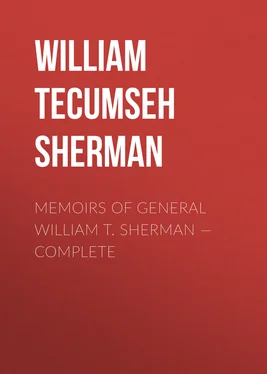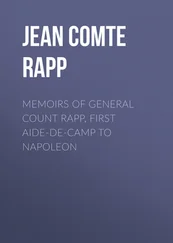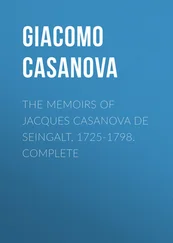William Tecumseh Sherman - Memoirs of General William T. Sherman — Complete
Здесь есть возможность читать онлайн «William Tecumseh Sherman - Memoirs of General William T. Sherman — Complete» — ознакомительный отрывок электронной книги совершенно бесплатно, а после прочтения отрывка купить полную версию. В некоторых случаях можно слушать аудио, скачать через торрент в формате fb2 и присутствует краткое содержание. Жанр: Биографии и Мемуары, История, foreign_edu, foreign_antique, foreign_prose, на английском языке. Описание произведения, (предисловие) а так же отзывы посетителей доступны на портале библиотеки ЛибКат.
- Название:Memoirs of General William T. Sherman — Complete
- Автор:
- Жанр:
- Год:неизвестен
- ISBN:нет данных
- Рейтинг книги:4 / 5. Голосов: 1
-
Избранное:Добавить в избранное
- Отзывы:
-
Ваша оценка:
- 80
- 1
- 2
- 3
- 4
- 5
Memoirs of General William T. Sherman — Complete: краткое содержание, описание и аннотация
Предлагаем к чтению аннотацию, описание, краткое содержание или предисловие (зависит от того, что написал сам автор книги «Memoirs of General William T. Sherman — Complete»). Если вы не нашли необходимую информацию о книге — напишите в комментариях, мы постараемся отыскать её.
Memoirs of General William T. Sherman — Complete — читать онлайн ознакомительный отрывок
Ниже представлен текст книги, разбитый по страницам. Система сохранения места последней прочитанной страницы, позволяет с удобством читать онлайн бесплатно книгу «Memoirs of General William T. Sherman — Complete», без необходимости каждый раз заново искать на чём Вы остановились. Поставьте закладку, и сможете в любой момент перейти на страницу, на которой закончили чтение.
Интервал:
Закладка:
When General Kearney first departed we took his office at Larkin's; but shortly afterward we had a broad stairway constructed to lead from the outside to the upper front porch of the barracks. By cutting a large door through the adobe-wall, we made the upper room in the centre our office; and another side-room, connected with it by a door, was Colonel Mason's private office.
I had a single clerk, a soldier named Baden; and William E. P. Hartnell, citizen, also had a table in the same room. He was the government interpreter, and had charge of the civil archives. After Halleck's return from Mazatlan, he was, by Colonel Mason, made Secretary of State; and he then had charge of the civil archives, including the land-titles, of which Fremont first had possession, but which had reverted to us when he left the country.
I remember one day, in the spring of 1848, that two men, Americans, came into the office and inquired for the Governor. I asked their business, and one answered that they had just come down from Captain Sutter on special business, and they wanted to see Governor Mason in person. I took them in to the colonel, and left them together. After some time the colonel came to his door and called to me. I went in, and my attention was directed to a series of papers unfolded on his table, in which lay about half an ounce of placer gold. Mason said to me, "What is that?" I touched it and examined one or two of the larger pieces, and asked, "Is it gold?" Mason asked me if I had ever seen native gold. I answered that, in 1844, I was in Upper Georgia, and there saw some native gold, but it was much finer than this, and that it was in phials, or in transparent quills; but I said that, if this were gold, it could be easily tested, first, by its malleability, and next by acids. I took a piece in my teeth, and the metallic lustre was perfect. I then called to the clerk, Baden, to bring an axe and hatchet from the backyard. When these were brought, I took the largest piece and beat it out flat, and beyond doubt it was metal, and a pure metal. Still, we attached little importance to the fact, for gold was known to exist at San Fernando, at the south, and yet was not considered of much value. Colonel Mason then handed me a letter from Captain Sutter, addressed to him, stating that he (Sutter) was engaged in erecting a saw-mill at Coloma, about forty miles up the American Fork, above his fort at New Helvetia, for the general benefit of the settlers in that vicinity; that he had incurred considerable expense, and wanted a "preemption" to the quarter-section of land on which the mill was located, embracing the tail-race in which this particular gold had been found. Mason instructed me to prepare a letter, in answer, for his signature. I wrote off a letter, reciting that California was yet a Mexican province, simply held by us as a conquest; that no laws of the United States yet applied to it, much less the land laws or preemption laws, which could only apply after a public survey. Therefore it was impossible for the Governor to promise him (Sutter) a title to the land; yet, as there were no settlements within forty miles, he was not likely to be disturbed by trespassers. Colonel Mason signed the letter, handed it to one of the gentlemen who had brought the sample of gold, and they departed. That gold was the first discovered in the Sierra Nevada, which soon revolutionized the whole country, and actually moved the whole civilized world. About this time (May and June, 1848), far more importance was attached to quicksilver. One mine, the New Almaden, twelve miles south of San Jose, was well known, and was in possession of the agent of a Scotch gentleman named Forties, who at the time was British consul at Tepic, Mexico. Mr. Forties came up from San Blas in a small brig, which proved to be a Mexican vessel; the vessel was seized, condemned, and actually sold, but Forties was wealthy, and bought her in. His title to the quicksilver-mine was, however, never disputed, as he had bought it regularly, before our conquest of the country, from another British subject, also named Forties, a resident of Santa Clara Mission, who had purchased it of the discoverer, a priest; but the boundaries of the land attached to the mine were even then in dispute. Other men were in search of quicksilver; and the whole range of mountains near the New Almaden mine was stained with the brilliant red of the sulphuret of mercury (cinnabar). A company composed of T. O. Larkin, J. R. Snyder, and others, among them one John Ricord (who was quite a character), also claimed a valuable mine near by. Ricord was a lawyer from about Buffalo, and by some means had got to the Sandwich Islands, where he became a great favorite of the king, Kamehameha; was his attorney-general, and got into a difficulty with the Rev. Mr. Judd, who was a kind of prime-minister to his majesty. One or the other had to go, and Ricord left for San Francisco, where he arrived while Colonel Mason and I were there on some business connected with the customs. Ricord at once made a dead set at Mason with flattery, and all sorts of spurious arguments, to convince him that our military government was too simple in its forms for the new state of facts, and that he was the man to remodel it. I had heard a good deal to his prejudice, and did all I could to prevent Mason taking him, into his confidence. We then started back for Monterey. Ricord was along, and night and day he was harping on his scheme; but he disgusted Colonel Mason with his flattery, and, on reaching Monterey, he opened what he called a law-office, but there were neither courts nor clients, so necessity forced him to turn his thoughts to something else, and quicksilver became his hobby. In the spring of 1848 an appeal came to our office from San Jose, which compelled the Governor to go up in person. Lieutenant Loeser and I, with a couple of soldiers, went along. At San Jose the Governor held some kind of a court, in which Ricord and the alcalde had a warm dispute about a certain mine which Ricord, as a member of the Larkin Company, had opened within the limits claimed by the New Almaden Company. On our way up we had visited the ground, and were therefore better prepared to understand the controversy. We had found at New Almaden Mr. Walkinshaw, a fine Scotch gentleman, the resident agent of Mr. Forbes. He had built in the valley, near a small stream, a few board-houses, and some four or five furnaces for the distillation of the mercury. These were very simple in their structure, being composed of whalers' kettles, set in masonry. These kettles were filled with broken ore about the size of McAdam-stone, mingled with lime. Another kettle, reversed, formed the lid, and the seam was luted with clay. On applying heat, the mercury was volatilized and carried into a chimney-stack, where it condensed and flowed back into a reservoir, and then was led in pipes into another kettle outside. After witnessing this process, we visited the mine itself, which outcropped near the apex of the hill, about a thousand feet above the furnaces. We found wagons hauling the mineral down the hill and returning empty, and in the mines quite a number of Sonora miners were blasting and driving for the beautiful ore (cinnabar). It was then, and is now, a most valuable mine. The adit of the mine was at the apex of the hill, which drooped off to the north. We rode along this hill, and saw where many openings had been begun, but these, proving of little or no value, had been abandoned. Three miles beyond, on the west face of the bill, we came to the opening of the "Larkin Company." There was evidence of a good deal of work, but the mine itself was filled up by what seemed a land-slide. The question involved in the lawsuit before the alcalde at San Jose was, first, whether the mine was or was not on the land belonging to the New Almaden property; and, next, whether the company had complied with all the conditions of the mite laws of Mexico, which were construed to be still in force in California.
Читать дальшеИнтервал:
Закладка:
Похожие книги на «Memoirs of General William T. Sherman — Complete»
Представляем Вашему вниманию похожие книги на «Memoirs of General William T. Sherman — Complete» списком для выбора. Мы отобрали схожую по названию и смыслу литературу в надежде предоставить читателям больше вариантов отыскать новые, интересные, ещё непрочитанные произведения.
Обсуждение, отзывы о книге «Memoirs of General William T. Sherman — Complete» и просто собственные мнения читателей. Оставьте ваши комментарии, напишите, что Вы думаете о произведении, его смысле или главных героях. Укажите что конкретно понравилось, а что нет, и почему Вы так считаете.












